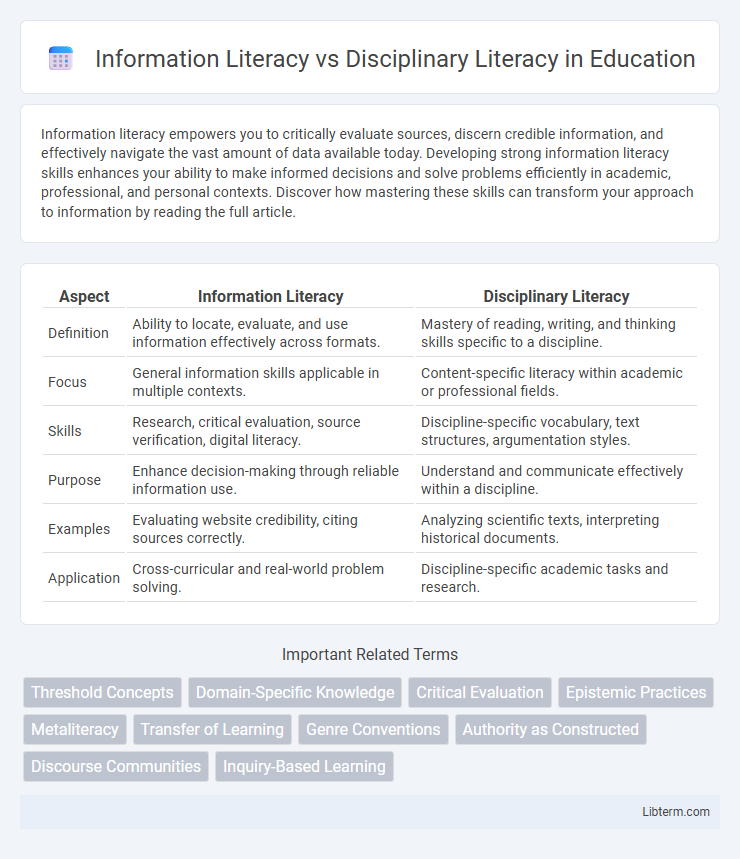Information literacy empowers you to critically evaluate sources, discern credible information, and effectively navigate the vast amount of data available today. Developing strong information literacy skills enhances your ability to make informed decisions and solve problems efficiently in academic, professional, and personal contexts. Discover how mastering these skills can transform your approach to information by reading the full article.
Table of Comparison
| Aspect | Information Literacy | Disciplinary Literacy |
|---|---|---|
| Definition | Ability to locate, evaluate, and use information effectively across formats. | Mastery of reading, writing, and thinking skills specific to a discipline. |
| Focus | General information skills applicable in multiple contexts. | Content-specific literacy within academic or professional fields. |
| Skills | Research, critical evaluation, source verification, digital literacy. | Discipline-specific vocabulary, text structures, argumentation styles. |
| Purpose | Enhance decision-making through reliable information use. | Understand and communicate effectively within a discipline. |
| Examples | Evaluating website credibility, citing sources correctly. | Analyzing scientific texts, interpreting historical documents. |
| Application | Cross-curricular and real-world problem solving. | Discipline-specific academic tasks and research. |
Understanding Information Literacy
Information literacy involves the ability to locate, evaluate, and effectively use information across various contexts, emphasizing critical thinking and ethical use of sources. It encompasses skills such as identifying credible sources, understanding research methods, and applying information to solve problems. Mastery of information literacy enables individuals to navigate complex data landscapes and make informed decisions in academic, professional, and everyday settings.
Defining Disciplinary Literacy
Disciplinary literacy refers to the specialized ways of reading, writing, and thinking that are unique to specific academic disciplines such as science, history, or mathematics. It involves understanding and using the language, tools, and methods that experts in a particular field employ to create and communicate knowledge. Unlike general information literacy, which focuses on evaluating and using information across contexts, disciplinary literacy emphasizes mastering the distinct literacy practices essential for proficiency in a given discipline.
Key Differences Between Information Literacy and Disciplinary Literacy
Information Literacy emphasizes the ability to locate, evaluate, and use information across various contexts, supporting critical thinking and research skills applicable to multiple disciplines. Disciplinary Literacy focuses on mastering the specific language, content, and methods unique to particular academic fields, enabling deeper understanding and communication within that discipline. Key differences include the general applicability of information literacy versus the specialized, content-driven expertise required in disciplinary literacy.
Core Skills in Information Literacy
Information literacy centers on core skills such as evaluating sources for credibility, effectively searching databases, and ethically using information, enabling individuals to navigate complex data environments. Disciplinary literacy requires mastering specialized reading and writing conventions unique to specific academic fields, emphasizing content understanding over general information skills. Developing proficiency in information literacy enhances critical thinking and problem-solving across disciplines by fostering the ability to discern reliable information and apply it appropriately.
Core Skills in Disciplinary Literacy
Disciplinary literacy emphasizes core skills such as critical analysis, argumentation, and the use of specialized vocabulary within specific academic fields. Unlike general information literacy, which covers broad competencies in evaluating and using information, disciplinary literacy requires understanding genre conventions, content-specific methodologies, and authentic communication practices unique to disciplines like science, history, or literature. Mastery of these skills enables deeper comprehension and effective participation in domain-specific knowledge construction and problem-solving.
The Role of Context in Each Literacy
Information literacy emphasizes the ability to locate, evaluate, and use information effectively across various contexts, prioritizing critical thinking skills applicable to multiple disciplines. Disciplinary literacy focuses on the specific language, conventions, and methodologies unique to a particular field, embedding learning deeply within the discipline's context. The role of context in disciplinary literacy is crucial as it shapes the interpretation and application of knowledge, whereas in information literacy, context guides the relevance and credibility assessment of information sources.
Application Examples: Information vs Disciplinary Literacy
Information literacy involves the ability to locate, evaluate, and use information effectively across various contexts, exemplified by assessing the credibility of online sources during research. Disciplinary literacy focuses on the unique ways of reading, writing, and thinking within specific academic fields, demonstrated by analyzing primary historical documents in history or interpreting data sets in science. These application examples highlight the distinction, with information literacy emphasizing general research skills and disciplinary literacy requiring mastery of field-specific conventions and methods.
Challenges in Developing Literacies
Developing information literacy often challenges learners due to the rapidly evolving digital landscape and the need to critically evaluate vast amounts of online data. Disciplinary literacy poses difficulties because it requires mastering domain-specific language, conventions, and analytical methods unique to each academic field. Both literacies demand continuous adaptation and targeted instructional strategies to effectively integrate cognitive skills and contextual understanding.
Impact on Student Learning and Success
Information literacy enhances student learning by equipping learners with critical skills to evaluate, interpret, and use diverse information sources effectively across disciplines. Disciplinary literacy deepens understanding by focusing on specific reading, writing, and thinking practices unique to each academic field, promoting expertise and specialized knowledge. Together, these literacies drive academic success, ensuring students can navigate both broad information environments and discipline-specific challenges with confidence and precision.
Integrating Both Literacies in Educational Practice
Integrating information literacy and disciplinary literacy in educational practice enhances students' ability to critically evaluate sources while applying subject-specific knowledge and skills. Effective instruction combines strategies such as research skill development with domain-based content analysis to foster deeper understanding and problem-solving capabilities. Emphasizing both literacies promotes lifelong learning and adaptability across academic disciplines and real-world contexts.
Information Literacy Infographic

 libterm.com
libterm.com